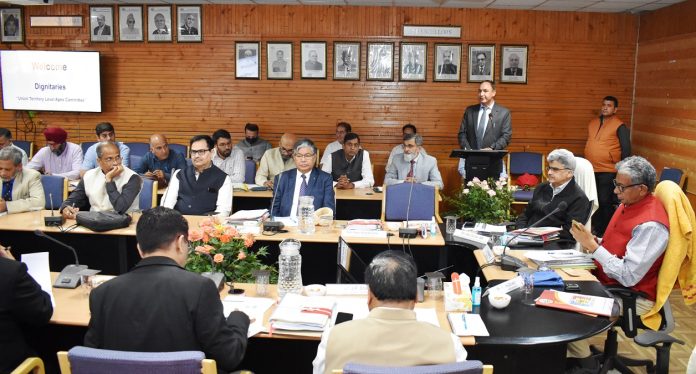SRINAGAR: “Jammu and Kashmir is poised to be the model bio-economy region of India for its varied agro-ecological zones which are bestowed with bounties of nature in the form of niche crops and commodities and the UTs potential to grow high-value crops that are off-season for rest of the country”, stated Dr Mangla Rai, Former Director General, ICAR, while chairing the 2nd meeting of UT Level Apex Committee for framing a comprehensive Agriculture Policy.
The Committee has been constituted by Lieutenant Governor, Manoj Sinha, to formulate a policy for transforming subsistence agriculture into a sustainable Agri-economy, that is aimed at making J&K number one region in the country in terms of growth in agriculture and securing the livelihood of its 14 million people. The policy aims to turn J&K into a net exporter of quality, certified and GI-tagged agriculture produces and products.
The committee held marathon meetings for three days at the SKUAST-K Shalimar campus, in which more than 100 officers of all the development departments and its twin agriculture universities participated. As many as, 32 project proposals were presented by various Technical Working Groups (TWGs) before the apex committee which were thoroughly deliberated upon and specific recommendations/directions were issued.
Other members of the Apex Committee included Dr Ashok Dalwai, CEO, NRAA; Atal Dulloo, Additional Chief Secretary, Agriculture Production Department; Dr PK Joshi, Secretary, NAAS, New Delhi; Dr Prabhat Kumar, Horticulture Commissioner, Department of Agriculture & Farmers Welfare, GoI; Dr HS Gupta, Former Director, IARI, Dr JP Sharma, Vice Chancellor, SKUAST Jammu with Dr Nazir Ahmad Ganai, Vice Chancellor, SKUAST Kashmir as its Member Secretary.
While interacting with the members of TWGs, Dr Ashok Dalwai, CEO, NRAA expressed optimism over J&Ks potential to break the perceived notion that economy and ecosystems are antagonistic. He expressed confidence that the two will synergize to lay the foundation of an inclusive, prosperous and sustainable agri-economy for the UT.
Atal Dullo reiterated the commitment of UT government to take agriculture to a higher pedestal of growth for which the government was willing to invest and take a lead in the country.
Dr PK Joshi exuded optimism about the resolve of the UT administration to double its output from the agriculture and allied sectors by 2027 given the current growth pointers and the potential improvement in productivity envisaged in various projects. He also laid emphasis on restructuring the agriculture marketing system for assured returns to farmers commensurate with the quality, niche products and good farming practices.
Dr H S Gupta made his expressed opinion for diversification to ensure nutritional and economic security in the region by way of sustainably harnessing the potential of the huge rain-fed area available in the UT.
Commissioner Horticulture emphatically expressed the need to build the capacity of J&K to reduce dependence on imports of planting material by promoting private agri-preuners in the development of elite planting material.
The committee members also congratulated Atal Dulloo, Additional Chief Secretary, APD and both the Vice Chancellors of SKUAST J/K project formulation was carried out in shortest possible time.
The 2nd meeting recorded clearance of 28 of the proposed projects on a wide range of agricultural sectors encompassing high-density fruit development, creation of seed production farms, boosting output from the Vegetable Sector, Niche Crops, Sericulture, Apiculture, Oil Seeds, Dairy Development, Sheep & Goat Development, Poultry Production as well as a new emphasis on developing J&K as a major player in cold water fisheries.
The other projects that were cleared for approval included food processing, effective agri-marketing, fodder development, mushroom production, medicinal & aromatic plants, floriculture, formulation of 300 FPOs, promotion of an integrated farming system, organic farming and rainfed area development. The focus of all projects and policies to be deployed in J&K is to harness the full potential of its agricultural sectors and to establish the value chains from farm to fork with an aim to boost the Agri-economy of the region.


